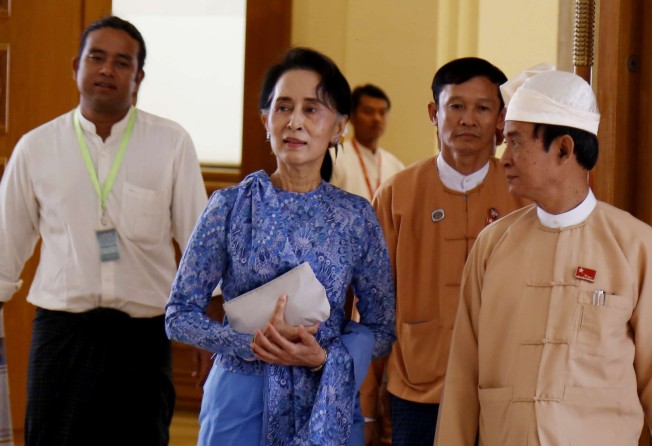New ‘state counsellor’ role affords Aung San Suu Kyi overarching power but may test relationship with military
The military – which still controls 25 per cent of the country’s parliament seats – had said that the new post violates the country’s constitution.

Myanmar’s parliament on Tuesday created a powerful new role for governing party leader Aung San Suu Kyi, the country’s revered Nobel laureate.
Suu Kyi, 70, will now become Myanmar’s “state counsellor”, a position that gives her wide and largely undefined powers that may violate the country’s military-drafted constitution, critics have said. The parliament’s military bloc strenuously objected to the move.
The new role will give Suu Kyi the ability to work with both parliamentary and ministerial leaders and will provide legal authority for her to direct all government activity and policy that is not controlled by the military, analysts say. She will also serve as the country’s foreign minister and minister to the president’s office.
Suu Kyi has made it clear since her party swept to victory in November that she would be leading her country in a post that’s “above” the president. Since then, she has tightly controlled the transition process, taking advice from just a handful of her closest advisers. One of her long-time allies, Htin Kyaw, was inaugurated as president last week.
“Aung San Suu Kyi obviously intends to institutionalise her role ‘above the president’,” said Renaud Egreteau, a fellow in the Asia Programme at the Wilson Centre in Washington, who is researching the role of Myanmar’s parliament as the country has moved from a military junta toward democracy.
Yet the country’s 2008 constitution – drafted by the military – says that the president is both head of the union and head of the executive branch, he notes.
“So whether that arrangement – the de facto creation of the prime ministership – would contradict the spirit of the constitution would then be a matter of interpretation,” Egreteau said.
The military – which still controls 25 per cent of the country’s parliament seats – had said that the new post violates the country’s constitution.
Suu Kyi, who spent years under house arrest during Myanmar’s military regime, is constitutionally barred from becoming president because of a provision that prohibits those with a foreign spouse or foreign children from serving in that job. Suu Kyi’s two sons are British, as was her late husband.
Khin Zaw Win, a former political prisoner and head of the Tanpadipa Institute think tank, said he thought that creating the new post set a dangerous precedent for the fledgling government by ceding Suu Kyi too much power.
“It’s very alarming and does not portend well for our country,” he said.